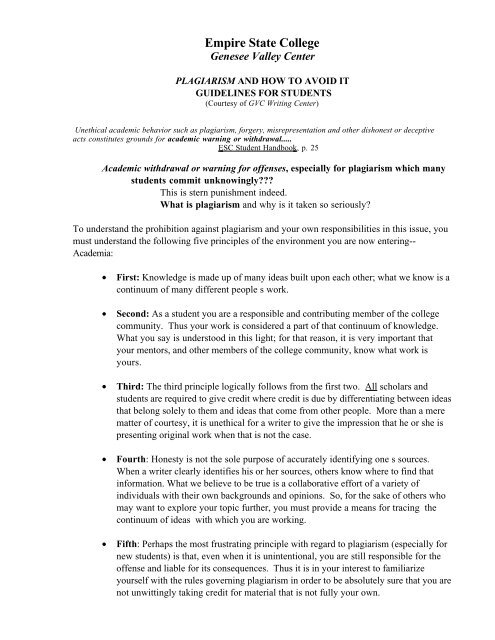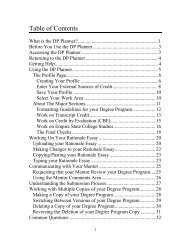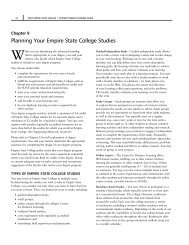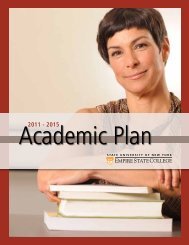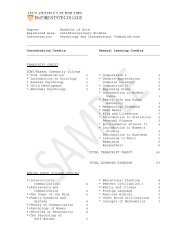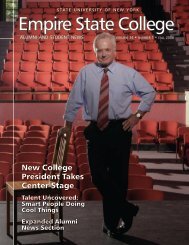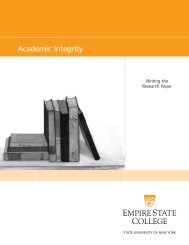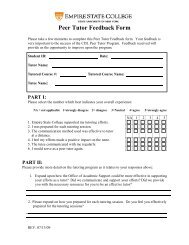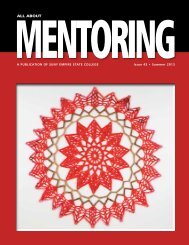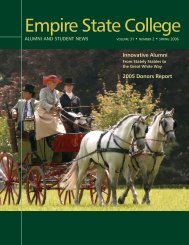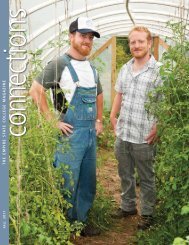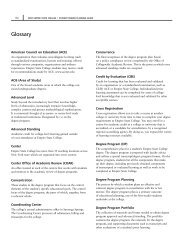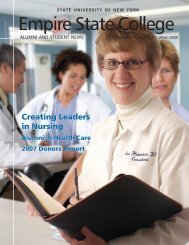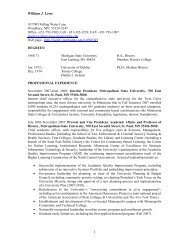SUNY Empire State College
SUNY Empire State College
SUNY Empire State College
Create successful ePaper yourself
Turn your PDF publications into a flip-book with our unique Google optimized e-Paper software.
<strong>Empire</strong> <strong>State</strong> <strong>College</strong><br />
Genesee Valley Center<br />
PLAGIARISM AND HOW TO AVOID IT<br />
GUIDELINES FOR STUDENTS<br />
(Courtesy of GVC Writing Center)<br />
Unethical academic behavior such as plagiarism, forgery, misrepresentation and other dishonest or deceptive<br />
acts constitutes grounds for academic warning or withdrawal.....<br />
ESC Student Handbook, p. 25<br />
Academic withdrawal or warning for offenses, especially for plagiarism which many<br />
students commit unknowingly<br />
This is stern punishment indeed.<br />
What is plagiarism and why is it taken so seriously<br />
To understand the prohibition against plagiarism and your own responsibilities in this issue, you<br />
must understand the following five principles of the environment you are now entering--<br />
Academia:<br />
• First: Knowledge is made up of many ideas built upon each other; what we know is a<br />
continuum of many different people s work.<br />
• Second: As a student you are a responsible and contributing member of the college<br />
community. Thus your work is considered a part of that continuum of knowledge.<br />
What you say is understood in this light; for that reason, it is very important that<br />
your mentors, and other members of the college community, know what work is<br />
yours.<br />
• Third: The third principle logically follows from the first two. All scholars and<br />
students are required to give credit where credit is due by differentiating between ideas<br />
that belong solely to them and ideas that come from other people. More than a mere<br />
matter of courtesy, it is unethical for a writer to give the impression that he or she is<br />
presenting original work when that is not the case.<br />
• Fourth: Honesty is not the sole purpose of accurately identifying one s sources.<br />
When a writer clearly identifies his or her sources, others know where to find that<br />
information. What we believe to be true is a collaborative effort of a variety of<br />
individuals with their own backgrounds and opinions. So, for the sake of others who<br />
may want to explore your topic further, you must provide a means for tracing the<br />
continuum of ideas with which you are working.<br />
• Fifth: Perhaps the most frustrating principle with regard to plagiarism (especially for<br />
new students) is that, even when it is unintentional, you are still responsible for the<br />
offense and liable for its consequences. Thus it is in your interest to familiarize<br />
yourself with the rules governing plagiarism in order to be absolutely sure that you are<br />
not unwittingly taking credit for material that is not fully your own.
Easier said than done!!! What if you re writing a paper on family issues in the<br />
workplace, and you re not certain if what you have to say is original Everything you d<br />
like to say seems to have already been said by one of the authors you have read. Here are<br />
a few tips:<br />
• To avoid passing off the author s viewpoint as your own, or to let it stand as a substitute for<br />
your own, you must first acknowledge the author, then go on to say why you think this<br />
viewpoint is or is not valid. In doing so, you have not only appropriately cited your source,<br />
but you have drawn a conclusion about the validity of that source and thereby made an<br />
original contribution to our understanding of your topic.<br />
• Being able to paraphrase, or summarize, an author s viewpoint without resorting to direct<br />
quotations is valued. It shows that you ve read, and understood, what the author has said so<br />
well that you can use your own words to describe that viewpoint. Remember, even though<br />
in paraphrasing, the words are yours, the idea belongs to someone else who must be<br />
given credit; failing to do so is plagiarism.<br />
• Direct copying of words or phrases without using quotation marks--even if the source is<br />
cited--is plagiarism too. Not only does this mislead your reader into thinking you wrote<br />
words you didn t write, it gives the false impression that you understood the author s ideas<br />
well enough to paraphrase them. Whenever you lift words verbatim from a text, they must<br />
be enclosed within quotation marks.<br />
• Some words and facts don t need to be cited because they are considered knowledge that is a<br />
part of the public domain or common knowledge. We all agree, for example, that<br />
Christopher Columbus landed in the Americas in 1492 (though we may differ as to whether<br />
or not we should celebrate that event), that the boiling point of water is 100 degrees<br />
Centigrade (though different experiments will use this fact to different ends) and that Mark<br />
Twain wrote Huckleberry Finn (though we may argue about the novel s racial politics).<br />
These facts will appear in sources, and can appear in your papers, without a citation because<br />
they ve been established by many different authorities. An author s unique interpretation of<br />
these facts, however, requires a citation. If you are in doubt about whether a certain piece of<br />
information is common knowledge or interpretation, it is a good rule of thumb to cite it.<br />
The format for citing authors will vary, depending on whether your area of study is in the<br />
humanities or sciences, but the need to avoid plagiarism by adequately documenting the<br />
source of your information remains the same. For further information on the different<br />
citation styles (whether it be APA, MLA or the Chicago Style Manual), speak to your<br />
mentor or contact the ESC Writing Center.<br />
Concerns about plagiarism can be overwhelming, partly because it s taken so seriously and<br />
partly because it s not always easy to know whether or not you have unintentionally plagiarized.<br />
If the rules governing plagiarism still seem fuzzy, speak to a Writing Center tutor. They can help<br />
clarify what to many new students is a confusing and somewhat nerve-wracking issue.


